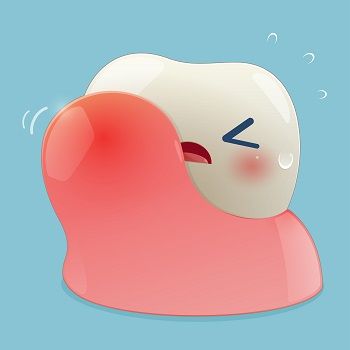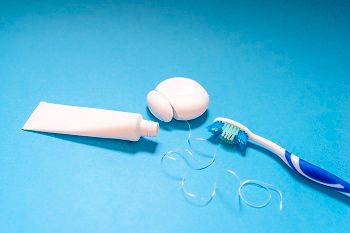Causes of teeth and gum sensitivity and How to avoid it.
Dr. Hoss Abar
Have you ever felt a sudden, sharp pain or discomfort when eating or drinking something hot or cold or brushing your teeth? If yes, you might be experiencing sensitivity in your teeth and gums.
Teeth and gum sensitivity can be an uncomfortable and painful dental issue that affects many people. You may have sensitivity if you've ever experienced a sudden sharp pain or discomfort when eating or drinking something hot, cold, sweet, or sour. Teeth and gum sensitivity occurs when the enamel on your teeth, which is the protective outer layer, wears away, exposing the underlying dentin and nerves. This can be caused by various reasons, such as overbrushing, gum recession, tooth decay, tooth fractures, acidic foods and drinks, teeth grinding, and plaque buildup. The good news is that teeth and gum sensitivity are often preventable and treatable with proper dental care and a few lifestyle changes.
These factors can wear away the enamel, leading to sensitivity and pain. However, you can take steps to avoid sensitivity and keep your teeth and gums healthy. By understanding the causes of teeth and gum sensitivity and taking preventive measures, such as brushing and flossing regularly, using fluoride toothpaste, using a soft-bristled toothbrush, avoiding acidic foods and drinks, wearing a mouthguard to prevent teeth grinding, and visiting your dentist regularly, you can help keep your teeth and gums healthy and pain-free.
Here in this blog, we will uncover the causes of teeth and gum sensitivity and tips to avoid it.
Causes of Teeth and Gum Sensitivity
Here we will highlight some significant causes of teeth and gum sensitivity.
Overbrushing
Teeth and gum sensitivity can be caused by a standard dental practice known as overbrushing. This occurs when individuals exert too much force or brush their teeth too frequently, which results in the wearing away of the hard enamel layer. The exposure of the underlying dentin layer can cause discomfort and sensitivity in the teeth and gums. To prevent this, it's recommended that you use a soft-bristled toothbrush and brush your teeth with gentle, circular motions. This will help to prevent the enamel from wearing away and ensure that your teeth and gums remain healthy and free from sensitivity.
Gum Recession
When your gums begin to recede or pull back from your teeth, it can cause significant discomfort. This sensitivity can happen for various reasons, such as gum disease or brushing too vigorously. To prevent gum recession, it is recommended that you use a soft-bristled toothbrush and avoid applying too much pressure while brushing your teeth. Adding these simple steps into your routine can help protect your gums and prevent unnecessary discomfort.

Tooth Decay and Cavities
Experiencing tooth and gum, sensitivity can be attributed to tooth decay and cavities. The erosion of enamel and dentin from decay can uncover the nerves in the tooth, resulting in sensitivity. Thus, to prevent tooth decay and cavities, it's essential to maintain good oral hygiene habits like brushing and flossing regularly. Additionally, visiting your dentist for routine checkups can help you identify and address any dental issues before they worsen.
Tooth Fractures and Cracks
Fractures and cracks in the teeth can cause a great deal of discomfort, as they can expose the delicate dentin and nerves within. This can lead to sensitivity in teeth and gums, making it difficult to eat or drink without experiencing pain. To prevent these kinds of problems, it is advisable to avoid biting down on hard objects such as ice or hard candy, which can cause damage to the teeth. Additionally, if you regularly engage in sports or other physical activities, it is recommended that you wear a mouthguard for the protection of your teeth from potential trauma. By focusing on these simple precautions, you can help safeguard your dental health and enjoy a pain-free smile for years.
Acidic Foods and Drinks
Consuming foods and beverages high in acidity, such as citrus fruits, tomatoes, and soda, can lead to enamel erosion, exposing the dentin and nerves of your teeth and causing sensitivity in both your teeth and gums. To prevent this discomfort, limiting your consumption of acidic foods and drinks is recommended, or rinse your mouth thoroughly with water after consuming them.
Teeth Grinding
Bruxism (Teeth grinding) can lead to the erosion of the protective enamel layer of your teeth, leaving the sensitive dentin layer exposed. If you suffer from teeth grinding, taking preventive measures to avoid further damage is essential. Wearing a mouthguard during the night or day if you grind your teeth while awake can help alleviate the symptoms. Additionally, reducing stress levels can also aid in reducing teeth-grinding occurrences.
Plaque Buildup
Plaque buildup can provoke inflammation and sensitivity in the gums, eventually leading to discomfort or pain in both teeth and gums. Good oral hygiene, such as brushing and flossing regularly, is crucial to prevent plaque buildup. Additionally, visiting your dentist for professional cleanings regularly can also aid in preventing plaque buildup and keeping gums healthy.
How to Avoid Teeth and Gum Sensitivity?
This blog section will highlight tips to avoid teeth and gum sensitivity.
- Brush and Floss Regularly
Maintaining good oral hygiene by brushing your teeth twice daily and flossing once daily is crucial. Use a soft-bristled toothbrush and gently brush your teeth in circular motions, covering all surfaces and the gum line. Flossing is also crucial in removing food particles and plaque that can't be reached by brushing alone.

- Use a Fluoride Toothpaste
Fluoride is a mineral that can help replace the minerals lost from your teeth when exposed to acid from bacteria in your mouth. Fluoride toothpaste helps strengthen your enamel and protect against tooth decay, which can cause sensitivity. This can help remineralize your teeth, making them stronger and more decay-resistant.
- Use a Soft-Bristled Toothbrush
A soft-bristled toothbrush helps avoid overbrushing and gum recession, which can cause sensitivity. A soft-bristled toothbrush can help remove plaque and debris without damaging your enamel or gums. When brushing, use gentle circular motions and avoid brushing too hard.
- Avoid Acidic Foods and Drinks
Limit your consumption of acidic foods and beverages. Because acidic foods and drinks, such as citrus fruits, tomatoes, and soda, can erode the enamel and expose the dentin and nerves, causing sensitivity. If you consume acidic foods and drinks, drink water afterward to help neutralize the acid in your mouth. Moreover, rinse your mouth with water after consuming them.
- Use a Mouthguard to Prevent Teeth Grinding
If you grind your teeth, specifically at night; a mouthguard can help protect your teeth and prevent sensitivity. A mouthguard can help absorb the grinding pressure, protecting your teeth from wear and damage. You can get a custom-fit mouthguard from your dentist or purchase an over-the-counter one.
- Reduce Stress
Stress can contribute to teeth grinding and clenching, which can cause sensitivity. Practicing stress reduction methods, such as exercise, meditation, or counseling, can help prevent teeth grinding and reduce sensitivity.
Visit Your Dentist Regularly
Routine dental checkups can help detect and treat any dental issues causing sensitivity. Be sure to see your dentist at least twice a year or as your dentist recommends. Your dentist can also clean your teeth and remove any plaque buildup contributing to sensitivity.
Following these tips can help prevent teeth and gum sensitivity and keep your teeth and gums healthy. If you experience persistent or severe sensitivity, consult your dentist, who can diagnose and treat the underlying issue.
Conclusion
In conclusion, teeth and gum sensitivity is a common dental issue that can cause discomfort and pain. Understanding the causes of teeth and gum sensitivity, such as overbrushing, gum recession, tooth decay, tooth fractures, acidic foods and drinks, teeth grinding, and plaque buildup, can help you prevent and manage this condition. Practicing the tips outlined in this blog post, such as brushing and flossing regularly, using a soft-bristled toothbrush, using fluoride toothpaste, avoiding acidic foods and drinks, and wearing a mouthguard to prevent teeth grinding, you can help keep your teeth and gums healthy and avoid sensitivity. If you experience persistent or severe sensitivity, consult your dentist, who can diagnose and treat the underlying issue.
Contact your Pinole dentist, Dr. Hoss Abar, DDS, MSD at Abar Orthodontics, to know about the causes of teeth and gum sensitivity.
Resource:
*This media/content or any other on this website does not prescribe, recommend, or prevent any treatment or procedure. Therefore, we highly recommend that you get the advice of a qualified dentist or other medical practitioners regarding your specific dental condition*
More To Explore
About Us
We believe that every patient deserves to feel confident about their smile. Years of experience creating beautiful and flawless smiles.
Opening Hours:
Monday - Thursday: 8:00 AM - 5:00 PM
Friday: 8:00 AM - 12:00 PM
Saturday - Sunday: Closed
Abar Orthodontics, Pinole, CA
1500 Tara Hills Drive., Suite 204
Pinole, CA 94564
Abar Orthodontics, San Leandro, CA
145 East 14th street., #100
San Leandro, CA 94577
© 2026Abar Orthodontics | All rights reserved | Powered by:Vigorant, Inc.
